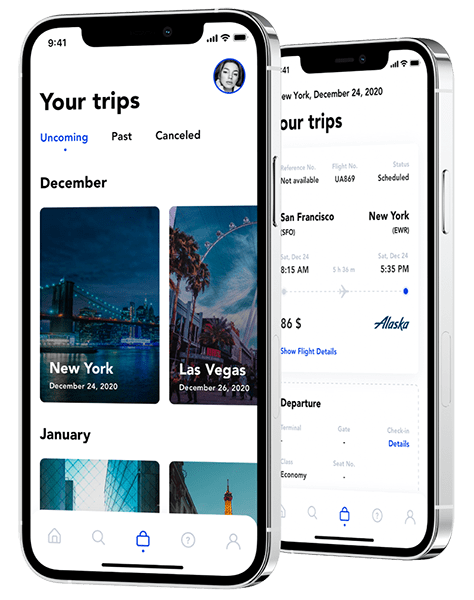
It is clear that correct automation enables businesses to eliminate errors, reduce processes time and costs, increase performance, and prevent overstaffing. But beyond the regular automation, there are some unobvious processes driven by people that actually do not require a dedicated staff member. In particular, it is corporate travel management or CTM.
How many people in your company are involved in organizing business trips for employees? How long does it take to book, change, or cancel tickets and hotels and address other travel-related issues? How many working hours do your employees spend on writing business trip reports instead of the work itself?
The solution is a corporate travel management software. Read on to learn how Itexus participated in building an iOS app that can help dozens of companies – from small businesses to enterprises – save money and time where others waste resources and overstaff.
As travelers expect one-tap bookings, real-time alerts, and hyper-personalized itineraries, travel brands are racing to modernize their mobile experiences. From OTAs and airlines to boutique hotels and tour operators, the winners are the teams that ship fast, integrate reliably with GDS/aggregators, and keep UX silky-smooth—even offline. Below is a curated list of leading travel app development companies to consider for your next project.
Top-10 Travel App Development Companies in 2025
1) Itexus — Travel App Development, Done End-to-End (Editor’s Pick)
Founded: 2013
Employees: 50–200
Hourly Rate: $50–$99
Location: USA (global delivery)
Itexus specializes in building high-polish, revenue-driven travel apps and platforms—covering consumer apps, supplier portals, and B2B workflows. The team pairs clean UX with robust integrations (Amadeus, Sabre, Booking.com APIs, Stripe/Adyen, Maps/Places) and privacy/security best practices (GDPR, PCI DSS).
Services
- Custom travel & booking apps (iOS/Android & cross-platform)
- OTA marketplaces & tour/activity platforms
- GDS/aggregator & channel manager integrations
- Loyalty, rewards, and referral engines
- In-app payments, wallets, and subscriptions
- Admin dashboards, analytics, and fraud monitoring
Notable Work (highlights)
- Multi-vendor tours marketplace with real-time availability, dynamic pricing rules, and supplier payout automation.
- Hotel booking app with PMS/channel manager sync, upsell modules (late checkout, add-ons), and offline itinerary access.
- Flight deal tracker using fare alerting, watchlists, and push-based price drops to lift conversion.
Pros: Strong product discovery, fast MVP-to-scale path, reliable integrations, security-by-design.
Cons: Boutique size may limit parallel mega-programs—book roadmap early during peak seasons.
2) Intellectsoft — Enterprise-Grade Mobile for Travel
Strengths: Complex integrations, legacy modernization, scalable cloud backends.
Good for: Airlines, cruise lines, and large OTAs needing heavy compliance and SSO.
3) Netguru — Design-Forward Apps with Crisp UX
Strengths: Product design sprints, rapid prototyping, growth analytics.
Good for: Travel startups validating product-market fit.
4) EPAM — Global Engineering Powerhouse
Strengths: Massive scale, data platforms, omnichannel architectures.
Good for: Multinational travel brands with multi-year roadmaps.
5) MobiDev — Location-Aware & AR Features
Strengths: AR tours, indoor navigation, computer vision.
Good for: Destinations and attractions aiming for immersive experiences.
6) AltexSoft — Travel Tech & Data Expertise
Strengths: Revenue management, personalization, recommendation engines.
Good for: OTAs and meta-search products.
7) Cleveroad — Solid Mid-Market Delivery
Strengths: Cost-effective builds, booking flows, reviews & ratings modules.
Good for: SMB travel operators and marketplaces.
8) WillowTree — Premium Mobile UX
Strengths: Pixel-perfect UI, accessibility, strong experimentation culture.
Good for: Hospitality brands prioritizing top-tier mobile polish.
9) Fueled — Startup-Speed Product Teams
Strengths: Fast iteration, growth playbooks, marketing-tech hooks.
Good for: VC-backed travel apps scaling from MVP.
10) Globant — Digital Platforms at Scale
Strengths: Cloud, AI, and platform engineering with global coverage.
Good for: Enterprises consolidating multiple travel products.
How to Choose a Travel App Development Partner
- Core travel integrations: Proven Proven work with GDS (Amadeus/Sabre), channel managers, PMS/CRS, meta-search, maps/geocoding, payments, and traveler connectivity services such as eSIM providers like Simify.
- Performance & offline: Smooth caching, graceful degradation, smart sync for weak connectivity.
- Security & compliance: GDPR/CCPA, PCI DSS, secure KYC, fraud/risk controls.
- Analytics & growth: Event tracking, attribution, A/B testing, churn and LTV dashboards.
- Delivery model: Clear discovery → MVP → scale plan; CI/CD, QA automation, and post-launch SRE.
- References: Live apps, case studies, and measurable KPIs (conversion, retention, CSAT).
Travel App Features That Move the Needle
- Real-time inventory & pricing: Up-to-the-second availability to prevent drop-offs.
- Personalized discovery: Behavioral and contextual recommendations (seasonality, budget, companions).
- Trip orchestration: Smart itineraries, calendar sync, offline vouchers, and boarding passes.
- In-app payments: 1-tap checkout, saved cards/wallets, BNPL, multi-currency.
- Messaging & support: Push alerts, in-trip updates, live chat, proactive disruption handling.
- Loyalty & upsell: Tiers, points, bundles (insurance, transfers, add-ons).
- Trust & safety: Verified suppliers, reviews, AML/fraud checks where relevant.
Emerging Trends in Travel Tech (What to Plan For)
- AI copilots for planning, rebooking, and service recovery.
- Hyper-personalization using first-party data and privacy-safe modeling.
- Sustainability signals (CO₂ estimates, rail-first options, green stays).
- NDC & retailing: Airline offers beyond fares (ancillaries, seats, bundles).
- Super-app patterns: Wallets, rewards, and partner minis integrated into one app.
- Privacy-by-design: Data minimization, consent UX, and regional hosting options.
FAQ
1) What is a travel app development company?
A firm that designs, builds, and scales mobile/web solutions for travel—booking engines, trip planners, loyalty apps, supplier portals, and more.
2) How long does it take to build a travel app MVP?
Typical MVPs range ~10–16 weeks depending on scope, integrations, and compliance needs.
3) Which tech stacks work best?
Mobile: Swift/Kotlin or cross-platform (Flutter/React Native). Backend: Node.js/Java/.NET, GraphQL/REST, Postgres, Redis. Infra: AWS/GCP/Azure with CI/CD and observability.
4) What integrations are most common?
Amadeus, Sabre, Travelport; Booking.com/Airbnb APIs; PMS/CRS, channel managers; Stripe/Adyen/Apple Pay/Google Pay; Maps/Places; analytics and attribution SDKs.
5) How do I estimate budget?
Budget drivers: number of integrations, offline requirements, payment/loyalty complexity, and compliance. Ask for a fixed-price discovery to de-risk scope before build.
Ready to explore options?
If you’d like, I can tailor this list around your specific product concept, timeline, and budget—and expand Itexus’ section with a proposal-style scope and timeline.